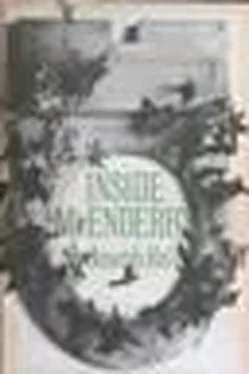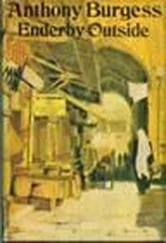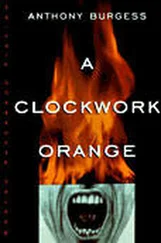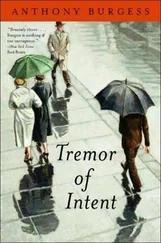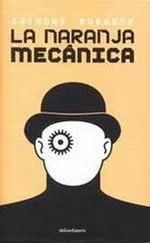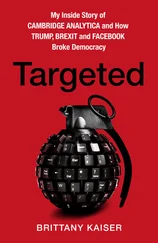"The giants of my youthful days," Sir George was saying, "Dobson, Watson, Sir Edward Arnold the mystic, Bridges the revolutionary, Calverley for laughter, Barry Pain for the profounder sigh." Enderby took a shallow draught of his cigar and felt it bite rawly. A childhood image again: the woman teacher in the elementary school explaining the soul and sin's carious effect upon it. She had chalked on the blackboard a big whitish shape like a cheese (the soul) and then, using a spit-wet finger, had spotted it like a Dalmatian (sins). For some reason, Enderby had always been able to taste that chalk-soul-a sharp vinegary raw potato-and he could taste it strongly now. "The soul," said Sir George appropriately, "which is a fair field for the poet's wandering, the sea whereon he sails his barque of rhyme, his mistress of whom he sings. The soul, which is the parson's Sunday concern, is the poet's daily bread." His daily raw potato. Enderby felt a borborygm rising.
Brrrfffp.
"I shall inflict," twinkled Sir George, "one of my own sonnets on you, on a theme appropriate to the occasion." He read out, with a voice pitched high and on one tuning-fork note, a poem of fourteen lines which was certainly no sonnet. It had verdant meads in it and a sun with effulgent rays, also-for some reason-a rosy-bosomed earth. Enderby, preoccupied with the need to suppress his body's noises, heard only fragments of an exquisitely bad poem and he nodded approvingly to show that he considered Sir George to have made a very good choice of an illustrative example of very bad poetry. As the last line scrannel-piped wretchedly out, Enderby felt a particularly loud noise coming, so he covered it with a laugh.
Ha ha (perrrpf) ha.
Sir George was rather surprised than displeased. He gaped down at Enderby for five seconds and then scanned his typescript tremblingly, as if fearful that something scatological had stolen ambiguously in. Reassured, he frowned on Enderby, his patches of skin shaking, and then took breath for the peroration. As he opened his mouth, Enderby, with infelicitous timing, gave vent.
Brrrbrrrpkrrrk.
Shem Macnamara said, "And as good and succinct a piece of criticism as ever I heard." He had a double-chinned stormy Irish face and was shag-haired and black-shirted (to save laundry). Enderby, in his daily poet's garb, was seedy-looking, but this man was a barn-sleeping hedge-dragged sturdy beggar. The white tired faces of the other guests-which Enderby could see but dimly-moved in titters. And suddenly Sir George himself seemed to grow tired. He smiled weakly, frowned, opened his mouth as in silent joy, frowned, swallowed, said in non sequitur:
"And it is for this reason that it gives me pleasure to bestow on our fellow singing-bird here, er er Enderby, the Goodby gold medal." Enderby rose to applause loud enough to drown three crackling intestinal reports. "And a cheque," said Sir George, with nostalgia of poet's poverty, "that is very very small but, one trusts, will stave off pangs for a month or two." Enderby took his trophies, shook hands, simpered, then sat down again. "Speech," said somebody. Enderby rose again, with a more subdued report, then realized that he was unsure of the exordial protocol. Did he say, "Mr Chairman"? Was there a chairman? If Sir George was the chairman should he say something other than "Mr Chairman"? Should he just say, "Sir George, ladies and gentlemen"? But, he noticed, there seemed to be somebody with a chain of office gleaming on his chest, hovering in the dusk, a mayor or lord mayor. What should he say-"Your Worship"? In time he saw that this was some sort of menial in charge of wine. Holding in wind, a nervously smiling Aeolus, Enderby said, loud and clear:
"St George." There was a new stir of tittering. "And the dragon," Enderby now had to add. "A British cymbal," he continued, seeing with horror that orthographical howler in a sort of neon lights before him. "A cymbal that tinkles in unsound brass if we are without clarity." There were appreciative casings of buttocks and shoulders: Enderby was going to make it brief and humorous. Desperately Enderby said, "As most of us are or are not, as the case may be. Myself included." Sir George, he saw, was throwing up wide face-holes at him, as though he, Enderby, were on a girder above the street. "Clarity," said Enderby, almost in tears, "is red wine for yodellers. And so," he gaped aghast at himself, "I am overjoyed to hand back this cheque to St George for charitable disposal. The gold medal he knows what he can do with." He could have died with shock and embarrassment at what he was saying; he was hurled on to the end in killing momentum, however. "Dross of the workaday world," he said, "as our fellow-singer Goodby so adequately disproves. And so," he said, back in the Army giving a talk on the British Way and Purpose, "we look forward to a time when the world shall be free of the shadow of oppression, the iron heel with its swastika spur no longer grinding into the face of prone freedom, democracy a reality, a fair day's pay for a fair day's work, adequate health services and a bit of peace hovering dovelike in the declining days of the aged. And in that belief and aspiration we move forward." He found that he could not stop. "Forward," he insisted, "to a time when the world shall be free of the shadow of oppression." Sir George had risen and was tottering out. "A fair day's work," said Enderby feebly, "for a fair day's pay. Fair play for all," he mumbled doubtfully. Sir George had gone. "And thereto," ended Enderby wretchedly, "I plight thee my truth."
The party broke up at once. Two men turned bitterly on Enderby. "If," said Shem Macnamara, "you didn't want the bloody money you might at least have remembered that there's others as do. Myself included," he mocked. He breathed, bafflingly, onions on Enderby, for onions had not formed any part of the meal. "I didn't mean it," said Enderby, near crying. "I didn't know what I was saying." Enderby's publisher said, "Want to ruin us you do?" in a sharp rising intonation. He was a young bright man from Newport. "Put your foot in it you have bloody nicely, man, make no mistake about it." A small man moustached like Kipling, with the same beetle-spectacles and a heavy watch-chain, came up to Enderby and took him firmly by Arry's lapels. "I'm Rawcliffe," he announced. He dragged Enderby away from the table in short dance-steps, lapels still held hard." Rawcliffe nodded many times, stopped nodding/cocked an ear, nodded in satisfaction, then just nodded, chewing. "Very fibrous duck," said Rawcliffe. "You know me. I'm in all the anthologies. Now then, Enderby, tell me, tell me in all sincerity what you're doing at the present time."
"Just writing, you know," said Enderby. He was trying to think who Rawcliffe was. Uneasily he heard behind him debates in small groups on his speech and its consequences for the retail book trade.
"One would have supposed," said Rawcliffe, tugging Arry's lapels like cow-teats, "mildly supposed, I suppose, that you would be writing." He chuckled, swallowed, and nodded. "Now then, Enderby, what? What are you writing? Tell me, elm," he laughed. "Tale told of stem or stone, eh? James Joyce, that is. Myth-maker, what?"
"Well," said Enderby, and, with babbling nerves, he blurted out a detailed synopsis of The Pet Beast.
"And the beast is really Original Sin, eh?" saw Rawcliffe. "Without Original Sin there is no civilization, is that it? Good, good. And the title, let's have that title again." He released the lapels, found a short pencil in a waistcoat pocket, licked the point, took out a cigarette-packet, shook it ruefully, then block-lettered Enderby's title on its bottom flap. "Good," he said again. "Infinitely obleeged." And he made off nodding. Enderby sadly watched him join a group of important poets who had not been above cynically taking a free meal-P.S. ffolliott, Peter Pitts, Albert Death-Stabbes, Rupert Tombs, or some such names. They had mostly murmured "Well done" to him at the pre-prandial sherry-bibbing. Now he was left alone with his wind, companionless. Medalless also, and chequeless. Rather a wasted trip, really.
Читать дальше
